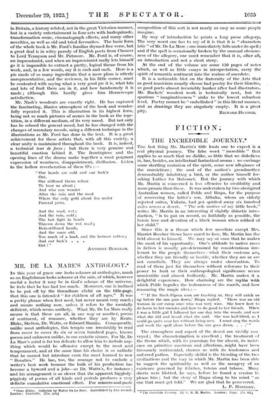MR. DE LA MARE'S ANTHOLOGY.*
TN this year of grace one looks askance at anthologies, much as an Englishman looks askance at the rain, of which, however useful a factor it may be in God's scheme of the universe, he feels that he has had too much. Moreover, one is inclined to be put off by the threadbare cliché on the title-page, that this one is intended " for children of all ages." It was a pretty phrase when first used, but never meant very much ; and means nothing now, unless it refers to the mentally deficient, which seems unlikely. What Mr. Dc La Mare really means is that these are all, in one way or another, poems of sentiment, of romance, whether they are by Keats, Blake, Skelton, Dr. Watts, or Edward Shanks. Consequently, unlike most anthologies, this tempts one irresistibly to read from cover to cover its six or seven hundred pages, known poems and unknown unlike, in one ecstatic seance. For Mr. Dc La Mare's mind is far too delicate to allow him to include any- thing which would be offensive except to the most arid temperament, and at the same time his choice is so catholic that he cannot but introduce even the most learned to new " Beauties." He has, too, the courage not to exclude a writer's best work because the bulk of his production has become a byword and a joke—as Dr. Watts's, for instance ; and his arrangement is so clever that the apparent higgledy- piggledy of poems of all kinds and periods produces a very definite cumulative emotional effect. For scissors-and-paste • Come Hither. Collected by Walter De La Mare. Embellished by Alec Duckas. London : Constable. [21s. meta
composition of this sort is not nearly so easy as some people imagine.
By way of introduction he prints a long proSe allegory. The very worst one has to say of it is that it is " character- istic " of Mr. De La Mare ; one immediately falls under its spell ; and if the spell is occasionally broken by the unusual obvious- ness of the allegory, one must remember that it is, after all, an introduction and not a short story.
At the end of the volume are some 150 pages of notes which, as well as little essays in interpretation, carry the spirit of romantic sentiment into the realms of anecdote.
It is a noticeable blot on the fraternity of the Arts that as good musicians usually choose bad poetry for their libretto, so good poets almost invariably hanker after bad illustrators. Mr. Buckels' woodcut work is technically neat, but its spurious " imaginativeness " sinks to the lowest suburban level. Poetry cannot be " embellished " in this literal manner, and as drawings they are singularly empty. It is a great


































 Previous page
Previous page